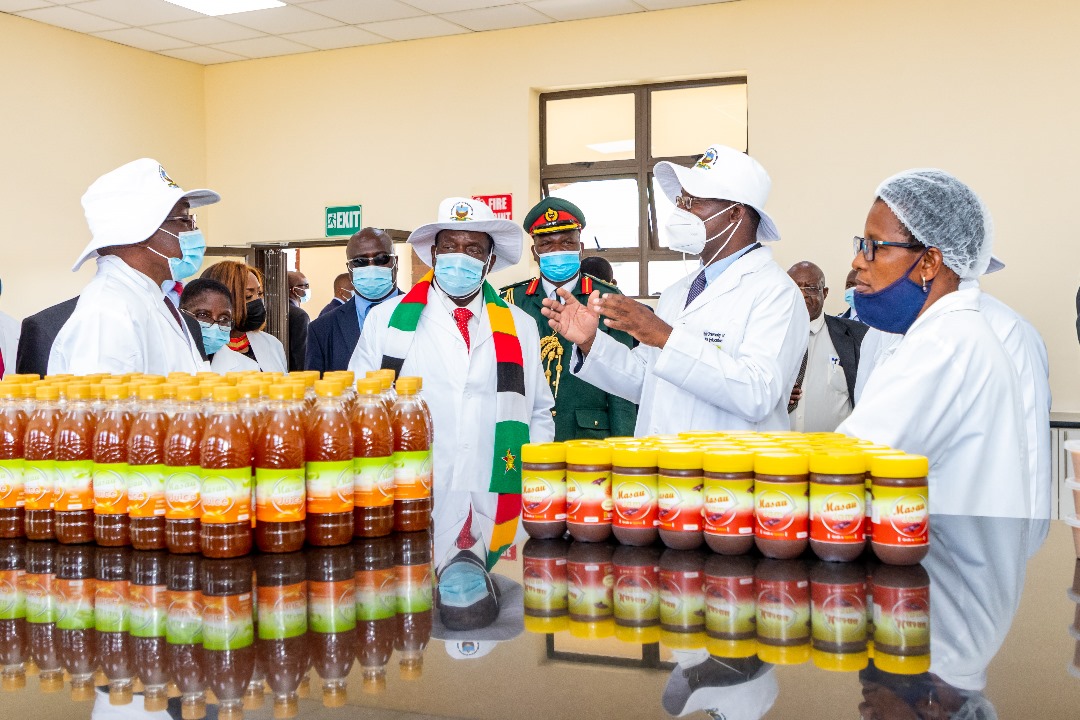By Marsha Sengwe
PRODUCTION of masau juices and yoghurts has started at the Bindura University of Science Education (BUSE) innovation hub in the provincial capital. In preparation of mass production, BUSE is constructing a plant with a capacity production of two million litres of the juice a year in Muzarabani. The juice, though still scarce is one of the few fine natural juices available in the country and already commanding a better market share, within Bindura and the university, among workers and students.
Eddius Makono, the university’s Director Advancement and Public Affairs, said this was part of advancing government’s Vision 2030. “As part of BUSE’s contribution to rural industrialisation, the university has focused on the abundant Masawu fruit in the Zambezi Valley with a value addition project which has seen the institution producing Masawu juice, jam, yogurt, sweets, Vitamin C syrup and tablets, tropical tincture and Masawu energy bar. “The juice has many varieties, which include Masawu with ginger and honey. It does not contain any processed sugar and is ideal for health enthusiasts,” he explained. Other varieties are the Masawu baobab pulp and Masawu with sugar blend.
The plant is also expected to produce two million litres of ciders and 500 litres of yoghurts annually. Ciders, however, are not yet on the market r.
According to Professor Eddie Mwenje, the university’s Vice Chancellor, the institution capitalised on the abundance of the fruit in the Zambezi Valley from Mbire, Muzarabani and Mt Darwin. They could have the juice throughout the year.
Masawu has Vitamin C which is equal or almost above that of oranges.
This has also resulted in the innovation hub producing masawu jam and Vitamin C syrup as well as some cosmeceuticals. Professor Mwenje said: “Communities would bring masawu to the plant and will be paid and in turn protect the trees.” He encouraged other universities to move the agenda of rural industrialisation.
A research study by Loveness Kuziwa Nyanga on Musau fruits established that they are of social, economic and nutritional significance in Zimbabwe. Its fruit contains more iron than an apple, and said the research, it was a well-known fact that iron is a necessary component for the transportation of oxygen in the body. Additionally, researchers have shown that the edible parts of this fruit contains higher amount of nutrients and minerals, such as iron, zinc, calcium, sodium magnesium, and vitamin C. Furthermore, studies indicate that 100 gram of pulp contains 70 to165 mg of ascorbic acid (vitamin C), while its fruits are enriched with vitamin A and B complex.
A survey to document the traditional processing techniques was conducted using a questionnaire and focus group discussions in each of the three districts of Mudzi, Mt Darwin and Muzarabani in Zimbabwe and the survey results showed that the masau fruit is usually gathered by women and children, and eaten raw or processed into products such as porridge, traditional cakes, mahewu (non-alcoholic fermented beverage), and jam, which are sold at local markets.
It is also naturally fermented under uncontrolled conditions and distilled into kachasu. The nutritional composition of the masau fruit was analysed.
The major conclusions of the thesis were: The survey conducted in the Zambezi valley in Zimbabwe, revealed that the masau fruits contribute significantly to the people’s livelihoods through subsistence use and as a safety net in drought periods. The masau fruits are nutritionally valuable to the people as they are a potential source of energy and nutrients such as carbohydrates, proteins and micronutrients like vitamin C, calcium, potassium, phosphorus, iron and zinc.



